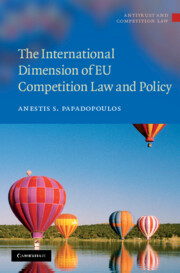Book contents
- Frontmatter
- Contents
- List of Tables
- Acknowledgements
- Abbreviations
- Table of Cases
- Table of Legislation
- Table of Treaties and Agreements
- 1 Introduction, Structure of the Book and Method
- 2 The National and International Dimensions of Competition Law and Policy
- 3 Bilateral Enforcement Cooperation Agreements
- 4 Bilateral Trade Agreements which Include Competition Provisions
- 5 Plurilateral Regional Agreements which Include Competition Provisions
- 6 The Role of Competition Law and Policy of the EU in Multilateral Negotiations on Competition
- 7 Conclusions: Main Findings of the Study
- Appendix 1 Economic Theories Applied to Competition Law
- Appendix 2 General Information about Plurilateral Regional Agreements
- Bibliography
- Index
6 - The Role of Competition Law and Policy of the EU in Multilateral Negotiations on Competition
Published online by Cambridge University Press: 10 November 2010
- Frontmatter
- Contents
- List of Tables
- Acknowledgements
- Abbreviations
- Table of Cases
- Table of Legislation
- Table of Treaties and Agreements
- 1 Introduction, Structure of the Book and Method
- 2 The National and International Dimensions of Competition Law and Policy
- 3 Bilateral Enforcement Cooperation Agreements
- 4 Bilateral Trade Agreements which Include Competition Provisions
- 5 Plurilateral Regional Agreements which Include Competition Provisions
- 6 The Role of Competition Law and Policy of the EU in Multilateral Negotiations on Competition
- 7 Conclusions: Main Findings of the Study
- Appendix 1 Economic Theories Applied to Competition Law
- Appendix 2 General Information about Plurilateral Regional Agreements
- Bibliography
- Index
Summary
Historical development of the negotiations on the adoption of a multilateral agreement on competition
Attempts under the aegis of the League of Nations and the proposed International Trade Organization
The history of the attempts to adopt a multilateral agreement on competition law goes back to 1925 when the first international competition code was proposed in a study conducted under the aegis of the League of Nations. The proposal was finally rejected by the League on the basis of arguments not much different than those developed to explain the lack of success of subsequent attempts at the adoption of a multilateral competition agreement: that divergent national attitudes towards restrictive business practices precluded the creation of an international code; and that an international regime would heavily infringe upon state sovereignty.
Almost twenty years later, a second significant attempt to include competition law in the international trading system was made. In particular, Chapter V of the proposed Havana Charter was dedicated to the regulation of restrictive business practices. According to the provisions of this charter, the member states of the proposed International Trade Organization (ITO) would have been obliged to adopt appropriate legislation and to cooperate with the ITO in order to prevent private and public commercial enterprises from engaging in practices that would restrain competition, limit access to markets, or foster monopolistic control, whenever such practices would have harmful effects on the expansion of production or trade and would interfere with the achievement of any of the other objectives listed in article 1 of the Charter.
- Type
- Chapter
- Information
- The International Dimension of EU Competition Law and Policy , pp. 205 - 257Publisher: Cambridge University PressPrint publication year: 2010



